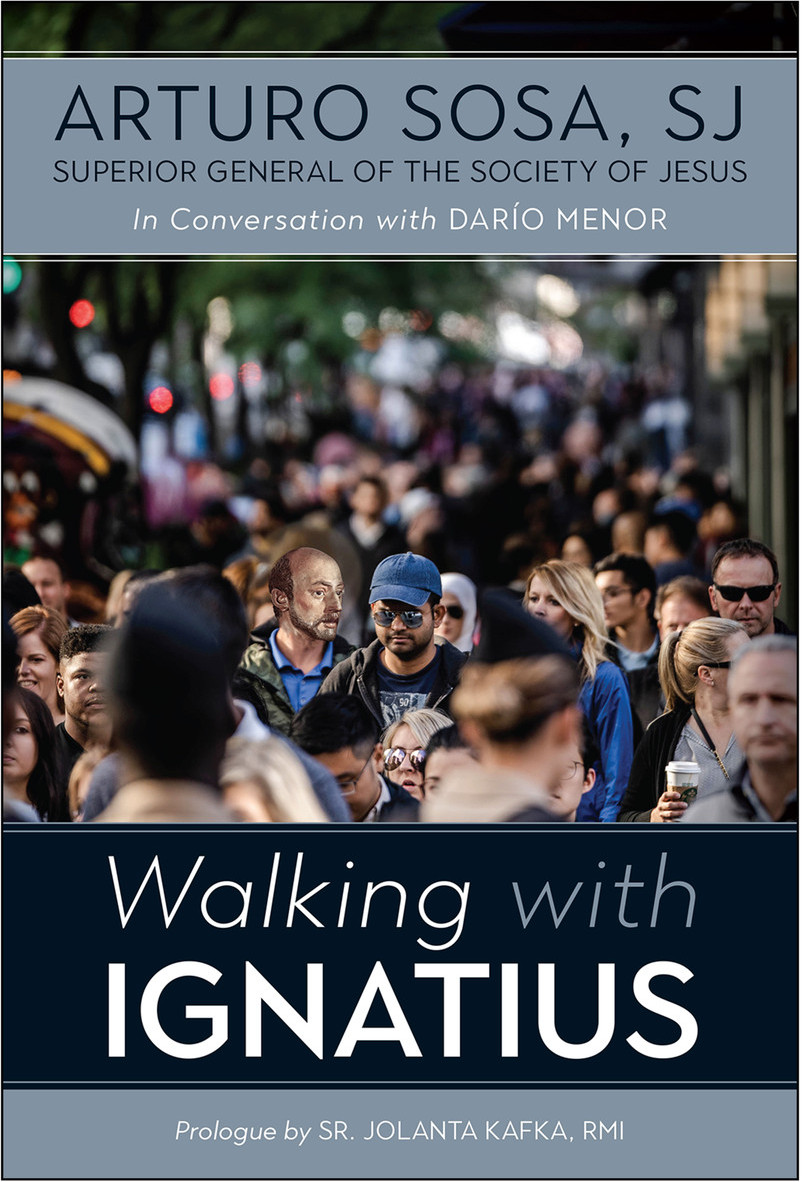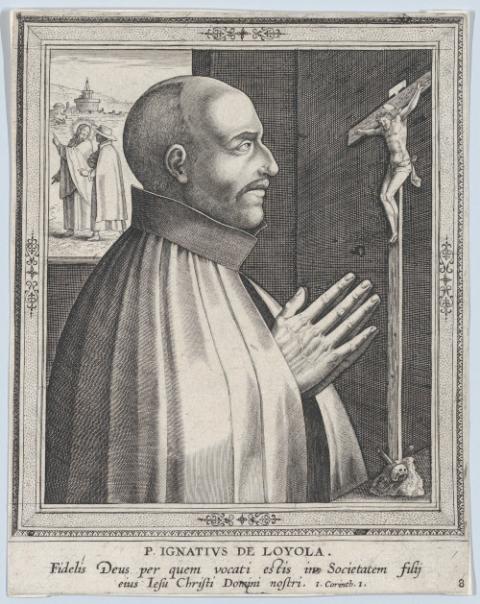Fr. Arturo Sosa, superior general of the Jesuits, speaks during the presentation of the book, "Walking with Ignatius," in Rome May 11, 2021. The book is based on an interview journalist Darío Menor, right, conducted with Sosa. (CNS/courtesy General Curia of the Society of Jesus)
Founded by St. Ignatius of Loyola in the 16th century and now with some 16,000 members in 112 countries, the Society of Jesus is Catholicism's largest religious order.
The Jesuits, as they are known, live and teach a particular spirituality and way of living — some would say pilgrims "walking" with Ignatius — as contemplatives in action.

During the final months of 2020, Rome-based Spanish journalist Darío Menor sat with Fr. Arturo Sosa, the Jesuit superior general, to "walk" with Ignatius. The book is the result of 24 hours of interviews conducted during 11 meetings at the Jesuit Curia in Rome and adds to the celebration of the Ignatian Year, begun March 20, 2021, the 500th anniversary of Ignatius' wounding at the Battle of Pamplona. Only after his recovery did Ignatius begin to walk, or rather, limp toward Rome, toward his exquisite understanding of human psychology and the ways of the heart.
In the interviews, Sosa kindly and straightforwardly explains the Ignatian charism that has freed so many men and women to bring the Gospel to so many persons in so many ways. He speaks about the world, the church and the priorities of the Society of Jesus in a manner that makes us all companions on the journey. The objective, as Sosa says, is "to grow, starting in the exact place you find yourself, guided by the Lord, and advancing step-by-step ... and [to] become a pilgrim yourself so that you may walk the path of Christian adventure in our changing world."
It is that changing world Sosa explores with Menor. He shares first Ignatius' story and then his own, as a student and priest in Venezuela and Rome, now the Jesuits' 31st superior general. He speaks of his own and other Jesuits' journeys as they follow and explore the society's Universal Apostolic Preferences, such as walking with the poor, recognizing the damage and threat to our earth and its creatures, creating educational opportunities, providing spiritual accompaniment, and so much more.
Advertisement
"Poverty is not an accident," Sosa declares, and indeed it is not. Analyzing the connections between and among hunger, lack of education and political unrest, he connects the manifestation of the love of God through fraternity, justice and a life of dignity for all. He parses the Jesuit emphasis on walking with the poor, describing the Fe y Alegria (Faith and Joy) network and the Nativity or Cristo Rey (Christ the King) schools, as well as the Jesuit "communities of insertion" in the poorest locales in countries throughout Africa, Latin America, Asia and Europe.
These, in addition to the Jesuit Refugee Service founded by Jesuit Fr. Pedro Arrupe, one of Sosa's predecessors, continue to address some of the presumed temporary situations of 40 years ago. The root problems that existed then exist today, and so Jesuits continue to turn their attention to the multiple plights of persons and their access to education.
Educational initiatives are especially high on the Jesuit agenda, and many projects support education and formation of persons young and older who are trapped by drugs, poverty or even by gang membership. These works are directly connected to the need to grow in awareness of the dangers to our fragile planet, our common home. Sosa describes Jesuit initiatives supporting the concept of "integral ecology," introduced by Pope Francis in "Laudato Si', On Care for Our Common Home" as starting with "the quest for social justice and the promotion of human dignity and the value of every person as a child of God." It is the "structural imbalances" that upend the balance in our world, he says.

St. Ignatius of Loyola, designed by Philips Galle (Metropolitan Museum of Art/Harris Brisbane Dick Fund)
Speaking specifically about education and Jesuit educational initiatives, Sosa reiterates the point of the interconnectedness of all life. He especially speaks to the problem of "individualism," which he says, "runs counter to the Christian vision of life [because] it is easy to slide from individualism into egotism." Yet it is Jesus' message that sets people free to recognize our common humanity.
Sosa speaks directly to Jesuit collaboration with laity, including religious institutes of women, and states that the Jesuit General Congregation 34 in 1995 (with Jesuit Fr. Peter-Hans Kolvenbach as superior general) approved a decree regarding the place of women in the church, "something we plan to go into in greater depth." He adds that "the majority of [Jesuit] apostolic works are directed today by laypeople, especially by women who enrich the way the mission develops."
What the book brings to its readers is both an explanation of what it means to "walk" with Ignatius and with the Society of Jesus in its many ministries. Added to each chapter of interview-reflections by Menor and Sosa are suggestions for prayer pertinent to the topics just examined, along with suggested biblical texts for meditation and contemplation. The final pages of each chapter include "Tips for Spiritual Conversation," so that the determinations arising from prayer and consideration of these topics can be shared and discussed with others, as a means of walking with Ignatius.








